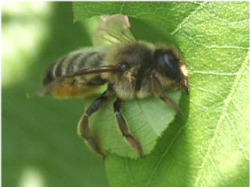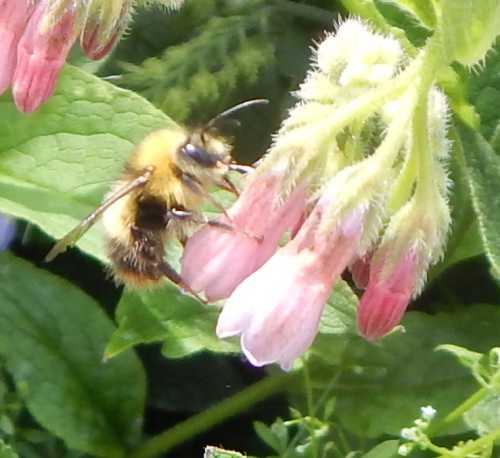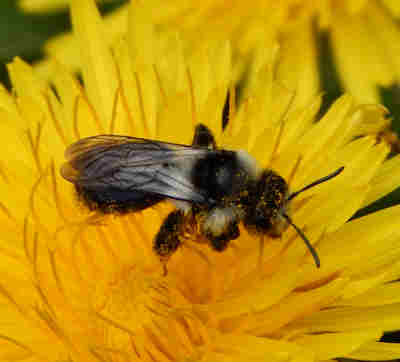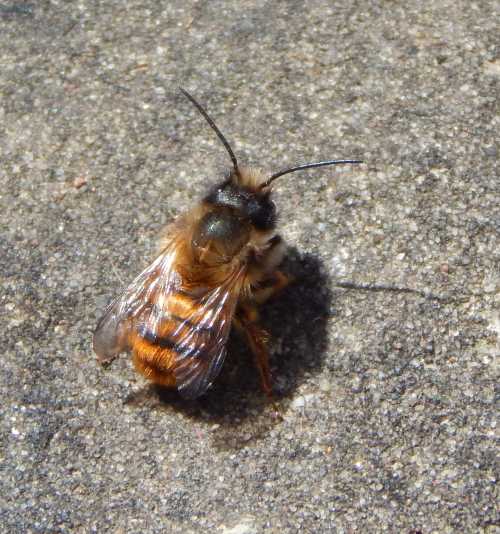Wild Bees And Pollination - Why Do Wild Bees Matter?
Wild bees (and indeed other pollinators) are hugely important, yet many pollinating species remain unsung heroes of the environment, gardens and countryside.
Wild Bees As Pollinators
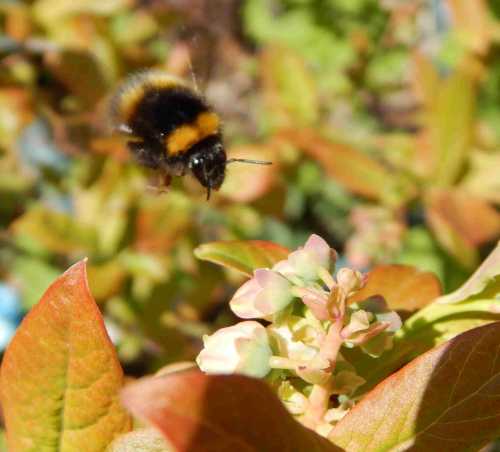 Bumble bee flying toward blueberry flower, helping the bush produce sweet, juicy fruits.
Bumble bee flying toward blueberry flower, helping the bush produce sweet, juicy fruits.Honey bees are crucial for pollination services - for example, almond crop in California are entirely dependent on honey bees.
However, efficient pollination of any crop depends on a number of factors.
The speed of pollination
The speed at which the bees work is a key factor. According
to the U.S. Department of Agriculture researchers, a study by Bosch and Kemp,
2001 revealed that only 250 female blue orchard bees (Osmia lignaria) are
needed to pollinate an acre of apples, that would usually have required the
service of one to two honey bee hives, with 15,000 to 20,000 workers in each.
Under the same conditions, bumble bees actually pollinate more flowers per bee than honey bees (from: Bumblebees Behaviour and Ecology; Prof. Dave Goulson; citing Poulson 1973; Free 1993).
Buzz Pollination
In some flowers, pollen is not easily brushed off from
anthers onto an insect body.
This means that although an insect may visit a flower to forage on nectar, they will not necessarily pollinate it.
However, a number of wild bee species are able to achieve buzz pollination by vibrating their flight muscles, thus shaking the pollen from the anthers.
Flower Shape
Some flowers require ‘tripping’ in order for pollination to occur. For
example, with Alfalfa, two petals hold the stamen which holds the
pollen-bearing anthers. When visited by bees, this ‘triggers’ the stamen to
spring forth, enabling contact with the bee, and transfer of pollen.
However, this triggering mechanism has been found to discourage honey bees, which, apparently, learn to avoid this triggering by approaching the flower from behind, thus enabling them to gather nectar but not pollen.
Other bee species – especially solitary bees of the Megachilidae family, are not put off by the triggering process, and are particularly effective for pollinating alfalfa.
Wild Bees And Crop Pollination
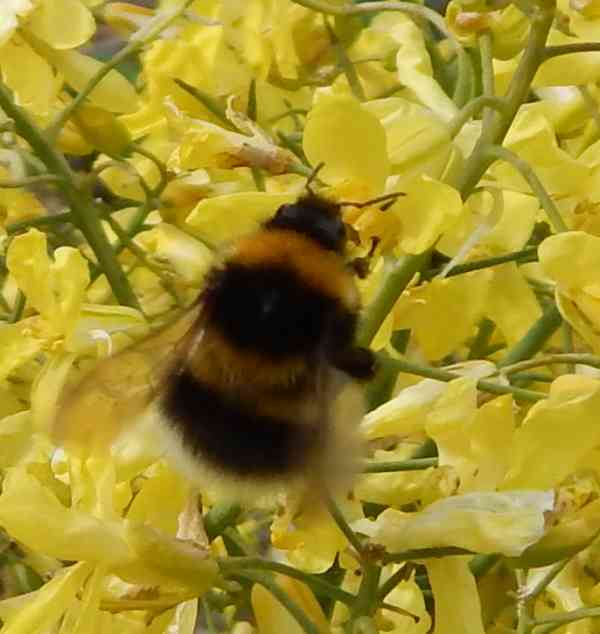 Bumble bee pollinating Kale flower. The Plant will go on to produce seeds.
Bumble bee pollinating Kale flower. The Plant will go on to produce seeds.It is correct that the service of honey bees to agriculture is vitally important. It is also true that honey bees are primarily used in commercial pollination, but this is due to raising of managed honey bee colonies, coupled with the lack of knowledge about the importance and sometimes greater efficiency of other pollinators of some crops.
As an example, the efficiency of bumble bees in commercial pollination of tomatoes, was not even discovered until the 1980s.
It was discovered in the Netherlands, where several companies began rearing Bombus terrestris. Within 3 years, 95% of tomato growers in the Netherlands had switched to bumble bee pollination. (Source: Bumblebees Behaviour and Ecology; Prof. Dave Goulson).
However, increasingly, whilst other bees are being reared for commercial pollination, it's a relatively recent development, (and one I am not so sure I’m keen on!).
Native Plants Need Native Wild Bees
Honey bees will certainly pollinate wild flowers, nevertheless, in some countries, the honey bee species is not native, and so it is unlikely any native wildflower flora have co-evolved with honey bees as the pollinator!
In some countries, there are relatively few wild colonies of honey bees.
Thus, although there may be thousands of honey bee colonies in a country, they are primarily limited in distribution by the movement of beekeepers. Honey bees will only fly within a radius of 3 to 5 miles to forage for food (although some sources state 12 miles).
So which species are doing the pollinating, when honey bees are not present?
It is likely to be a combination of wild bees, pollinating flies, beetles, moths and butterflies.
But Honey Bees DO Matter!
Honey bees are beautiful, fascinating, and highly important in their own right. They pollinate, inspire poetry, art, science and philosophy. They produce wax and indeed honey, which even has proven medicinal benefits - such as efficacy against cold sores.
On my page Why Do Honey Bees Matter?, I outline how important honey bees are, in terms of monitoring environmental stressors.
I cannot stress the importance of this (nor my love for this enchanting little creature) - enough.
Some people have the habit of viewing life in terms of competition, then transferring those values to wildlife.
But nature is interconnected, and can balance itself out beautifully.
All of wildlife plays a role –
there are no superfluous species, even if we think there are – just our
lack of understanding.
If you found this page helpful or interesting, I'd really be grateful if you would share it with others - if not this page, perhaps another, such as Gardening For Bees.
Thank you so much :) .
